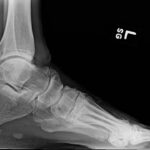Engaging patients in shared decision-making about their health management is increasingly important to improving health outcomes and quality of life for persons with arthritis and other rheumatic diseases. In shared decision-making, the patient and the provider are partners who share information and determine together the best therapeutic interventions to achieve desired health outcomes and patient goals.
Search results for: patient-centered care

What Clinicians Should Know About Midfoot Osteoarthritis
Midfoot OA experts offer an overview of a common, but under-recognized, form of OA, & discuss quality of life impacts, treatments, clinical evaluation procedures & the critical need for further research.

Cannabis for Pain Management in Rheumatology
‘Cannabis has a long history of being used for pain management,’ says Physician Editor Bharat Kumar, MD, MME, FACP, FAAAAI, RhMSUS. ‘What does it mean for rheumatology patients moving forward? Read our article for one answer to this question.’ As cannabis becomes more widely legalized, both in the U.S. and internationally, its use for pain…

Rheumatology Workforce for the 21st Century
As rheumatology care evolves into a team-based approach, the workforce is expanding to incorporate advanced practice providers, physical therapists and social workers, all of whom can play vital roles in patient care.

The 2024 ARP President’s & Merit Awards
ARP members honored for significant contributions to rheumatology research, education and patient care.
State Copay Accumulator Legislation: An Overview
As uncertainty persists around federal policies regarding copay accumulator programs, a growing number of states are stepping in. A total of 21 states have banned the programs and others are increasing transparency requirements

Ethics Forum: The Current Landscape of Artificial Intelligence in Medicine
A handful of articles on artificial intelligence (AI) have graced the pages of this publication in the past six years, including one by Bharat Kumar, MD, in November 2022. Dr. Kumar highlighted the exciting potential of AI in rheumatology, including machine learning (ML) algorithms for the prediction of response to methotrexate and a predictive model…

SMILE, an Online Lupus Tool, Can Aid Shared Decision Making
Patients with systemic lupus erythematosus (SLE) often face many concerns, fears and uncertainties that render “treatment decision making very difficult,” says Jasvinder Singh, MD, MPH, professor of medicine and epidemiology at the University of Alabama at Birmingham. Often these patients, who tend to be women from minority groups, “do not have access to easily understandable…

Getting to Know the New Foundation President
Liana Fraenkel, MD, MPH, credits much of her own career success to support from the Foundation, and she is eager to advance its mission during her presidency.

The 2023 ACR Awards of Distinction
SAN DIEGO—During ACR Convergence 2023 on Nov. 11, the ACR honored a group of individuals who have made significant contributions to rheumatology research, education and patient care by announcing the recipients of the ACR’s 2023 Awards of Distinction, as well as the 2023 ACR Masters who were recognized for their contributions to the field.
- « Previous Page
- 1
- …
- 8
- 9
- 10
- 11
- 12
- …
- 19
- Next Page »